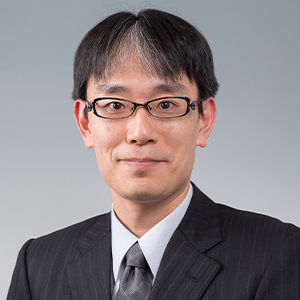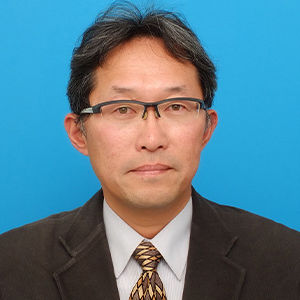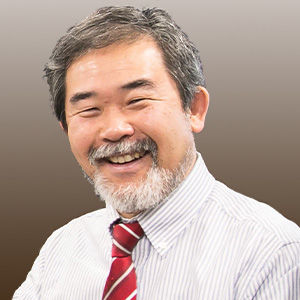Program

Moonshot Goal 3Realization of AI robots that autonomously learn, adapt to their environment, evolve in intelligence and act alongside human beings, by 2050.
Program Director (PD)FUKUDA ToshioVisiting Professor, Institute of Innovation for Future Society, Nagoya University
Outline
Considering Japan’s declining birthrate and aging population, it is important that robots can be used in all aspects of society - such as working in dangerous or understaffed sites, developing human frontiers, and supporting our everyday lives. For that purpose, robots must be able to learn and act on their own through the co-evolution of AI and robots. Our R&D aims to realize AI robots with advanced bodies and self-developed AI learning.
A Vision of Society in 2050 (Illustrated Guide)
What might the future look like in 2050 if Goal 3 is realized? An illustrated guide.
Message from PD
Our R&D aims to achieve the following three outcomes by 2050:
(1) AI robots that autonomously make judgements and act in environments where it is difficult for humans to act.
(2) An automated AI robot system that aims to discover impactful scientific principles and solutions, by thinking and acting in the field of natural science.
(3) AI robots that humans feel comfortable with, have physical abilities equivalent to or greater than humans, and grow in harmony with human life.
The following two concepts are core to our work:
(1) Coevolution: AI technology and robot technology cooperate to improve their own performance.
(2) Self-organization: AI technology and robot technology self-modify their own knowledge and functions to adapt to their environment.
R&D Projects
Selected in FY2020
Selected in FY2022
Past Project
| Project Manager | UENO Munetaka Research and Engineering leader, Space Exploration Innovation Hub Center, Japan Aerospace Exploration Agency |
|---|---|
| Outline |
The goal of international human exploration program is to establish independent biospheres in the extreme environments of the Moon and Mars, shaking off our dependency on Earth. This research project aims to realize biospheres in which humans can be active for a long period of time by conducting research and development toward the construction of a base system with smart technology, behavior-modifying technology, etc., while developing and utilizing AI robot technology for the elements backcasted by this achievement. |
AI Robots which Help to Envision Promising Future Together with Users and Encourage Action toward It
| Project Manager | OTAKE Mihoko Team Leader, RIKEN Center for Advanced Intelligence Project |
|---|---|
| Outline |
Behavioral change support robots will be developed, which help identify personal values, and encourage actions leading to well-being based on the identified personal values. This project aims to develop three key technologies: 1) to collect diverse stories including wisdom, knowledge, and experiences; 2) to estimate feelings, thoughts, and personal values from verbal and nonverbal behaviors during conversations; 3) to encourage actions through providing stories which indicate novel perspectives and manners based on identified personal values. We aim to realize AI robots that will by 2050 help to envision promising future together with users and encourage users for actions towards them. |
| Project Manager | MORISHIMA Keisuke Professor, Graduate School of Engineering, Osaka University |
|---|---|
| Outline |
By analyzing activity information and surrounding environment information obtained from a group of biological cyborgs equipped with ultra-small sensors, communication equipment and behavior control units, we will understand the principles of action and use them to develop a self-organizing platform using AI that stimulates human behavior and enables people and robots to collaborate without any sense of incongruity. By 2050, we aim to create a world where people and robots can work in harmony with each other. |
Advisors
Click here to see the list of advisors
| UEDA Naonori* | Deputy Director, RIKEN Center for Advanced Intelligence Project |
|---|---|
| KUBOTA Takashi* | Professor (non-tenured), School of Science and Technology, Meiji University |
| HASHIMOTO Hideki* | Professor, Faculty of Science and Engineering, Chuo University |
| ISHIZUKA Mitsuru | Professor Emeritus, The University of Tokyo |
| UEKI Miwa | Senior Research Manager, Social Digital Twin Core Project Converging Technologies Laboratory Fujitsu Research, FUJITSU LIMITED. |
| OKURA Michiko | Initiative Professor, Research and Development Initiative, Chuo University / Visiting Professor, S.I.T. Research Laboratories, Shibaura Institute of Technology |
| OKUNO Hiroshi G. | Professor Emeritus, Kyoto University |
| OBATA Nobuaki | Specially Appointed Professor, Center for Data-Driven Science and Artificial Intelligence, Tohoku University |
| KASAHARA Hironori | Professor, Faculty of Science and Engineering, Waseda University |
| KOKUBU Hiroshi | Vice President, Kyoto University |
| SHIOZAWA Keiko | Director, Product Service Division, AdIn Research, Inc. |
| TATEYAMA Kazuyoshi | Professor, Research Organization of Science and Technology, Ritsumeikan University |
| TOMOEDA Toshio | Professor Emeritus, Kyushu University / Professor Emeritus, Osaka University |
| NAKASUKA Shinichi | Professor, Graduate School of Engineering, The University of Tokyo |
*Sub Program Director
Goal 3 News
Contact
Goal 3 Secretariat
Department of Moonshot Research and Development Program, Japan Science and Technology Agency
e-mail moonshot-goal3









